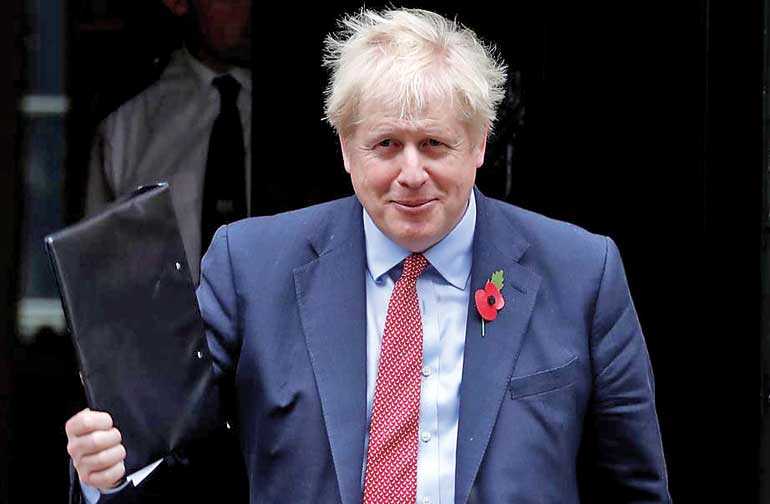Wednesday Feb 18, 2026
Wednesday Feb 18, 2026
Thursday, 31 October 2019 01:42 - - {{hitsCtrl.values.hits}}

Britain's Prime Minister Boris Johnson is seen on Downing Street in London, Britain - Reuters
LONDON (Reuters): Britain will hold its first December election in almost a century after Prime Minister Boris Johnson won approval from parliament on Tuesday for an early ballot aimed at breaking the Brexit deadlock.
After the European Union granted a third delay to the divorce that was originally supposed to take place on March 29, the United Kingdom, its parliament and its electorate remain divided on how, or indeed whether, to go ahead with Brexit.
Johnson, who had promised to deliver Brexit on Oct. 31 “do or die”, demanded a Dec. 12 election after parliament – where he has no majority – frustrated his attempts to ratify the last-minute divorce deal he struck with the EU earlier this month.
In a rare parliamentary success for Johnson after a string of defeats, his short bill calling for a Dec. 12 election was approved 438 to 20 in the House of Commons. The bill now goes to the House of Lords.
“It’s time to unite the country and get Brexit done,” Johnson said after meeting Conservative Party lawmakers who cheered him.
Before the vote, Johnson had said parliament was obstructing Brexit and thus damaging the economy by preventing investment decisions, and corroding faith in democracy.
The first Christmas election in Britain since 1923 would be highly unpredictable: Brexit has variously fatigued and enraged swathes of voters while eroding traditional loyalties to the two major parties, Conservative and Labour. Some politicians feel an election so close to Christmas could irritate voters, while campaigning and getting voters out could be hampered by cold winter weather and darkness setting in by mid-afternoon.
Ultimately, the electorate will have a choice between an emboldened Johnson pushing for his Brexit deal or a socialist government under Labour leader Jeremy Corbyn renegotiating the deal before another referendum.
The election result will be announced in the early hours of Friday the 13th. If no party wins conclusively, the Brexit deadlock would continue.
After four years of arguing over Brexit, almost all British politicians now agree an election is needed to break the cycle of inaction that has shocked allies of a country once considered a bastion of stable Western capitalism and democracy.
An election, though, could decide the fate of Brexit as well as the main players – Johnson, 55, and his rival Corbyn, 70.
When Johnson’s predecessor, Theresa May, bet on an early election in 2017, she lost her slender majority – a failure that ultimately prevented her from ratifying her Brexit deal in parliament and sank her political career.
Johnson’s Conservatives are ahead of Labour by an average of about 10 percentage points in polls this month, though pollsters underestimated the support for Brexit in 2016 and admit that the models they use are wilting beside the Brexit furnace.
Both major parties will have to fight on at least three fronts: against each other while the hardline Brexit Party led by Nigel Farage seeks to poach Brexit voters and the Liberal Democrats seeks to win over opponents of Brexit.